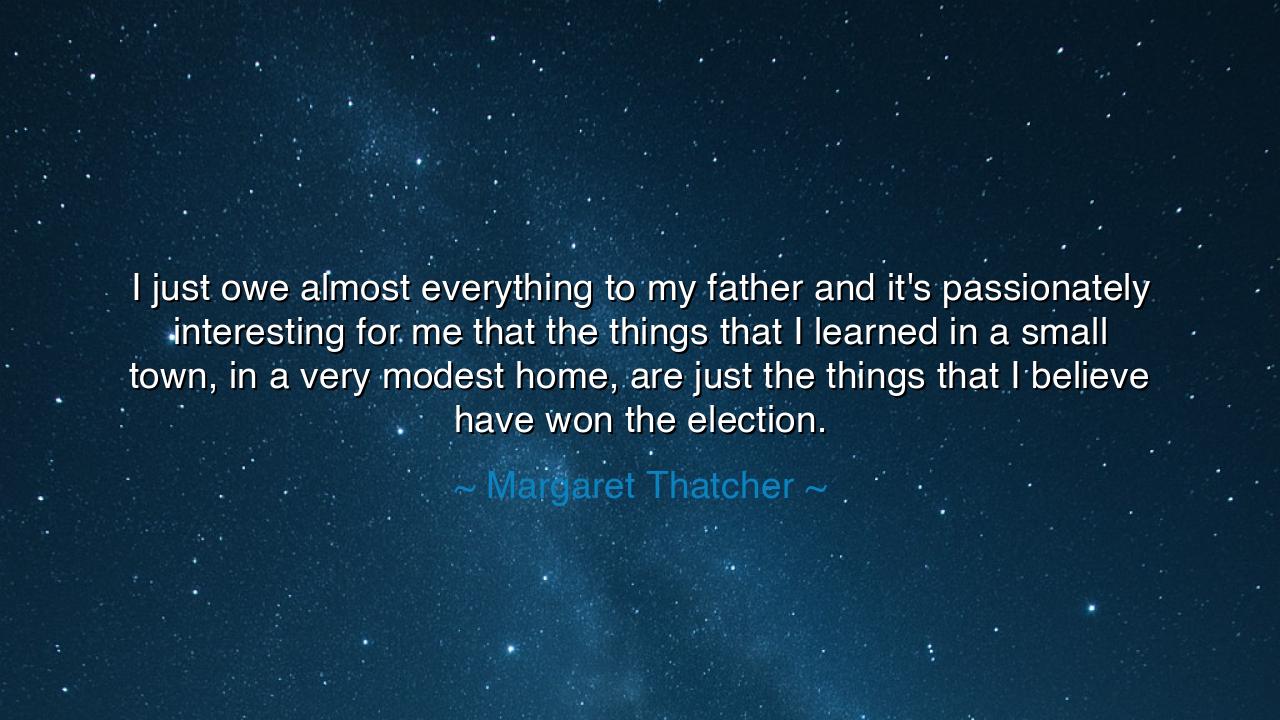
I just owe almost everything to my father and it's passionately
I just owe almost everything to my father and it's passionately interesting for me that the things that I learned in a small town, in a very modest home, are just the things that I believe have won the election.






The words of Margaret Thatcher — “I just owe almost everything to my father, and it’s passionately interesting for me that the things that I learned in a small town, in a very modest home, are just the things that I believe have won the election.” — are a hymn to the power of humble beginnings and the enduring wisdom of character. Beneath these words lies not only gratitude but a revelation: that greatness is not born in palaces, but in the quiet lessons of ordinary homes. In this reflection, the Iron Lady — a figure of strength and conviction — pays tribute to the virtues of simplicity, to the discipline, faith, and integrity that shape the foundation of all enduring success. Her words speak not merely of politics, but of the ancient truth that values, not circumstances, determine the destiny of a soul.
Thatcher’s father, Alfred Roberts, was a grocer and a Methodist lay preacher in the small English town of Grantham. He was not a man of wealth, but of principle. It was in the narrow aisles of his shop and in the wooden pews of his church that young Margaret learned the moral arithmetic that would later define her leadership: that hard work is sacred, that thrift builds freedom, and that responsibility is the cornerstone of both individual and nation. These were not grand philosophies learned from books, but the practical wisdom of daily life — the kind that molds the spirit quietly, like a craftsman shaping stone. From these modest roots grew a mind that would one day lead an empire.
When Thatcher says that it was those same small-town lessons that “won the election,” she reminds us of something eternal: that authenticity triumphs over pretense, and conviction over calculation. Her success was not a product of privilege or clever rhetoric, but of the constancy of belief — of having been forged in the fires of struggle, and never forgetting where she came from. In her, the humble virtues of her father’s shop — discipline, honesty, and service — were transformed into the political armor of leadership. She stood before the world as proof that true power does not come from birth or circumstance, but from steadfastness of spirit.
The ancients would have recognized this truth well. Consider the story of Cincinnatus, the Roman farmer who was called from his plow to defend the Republic. He led Rome to victory and then returned to his fields, content with the soil that had nourished him. Like Thatcher, his greatness lay not in ambition, but in duty. The values learned in simplicity — humility, perseverance, devotion — became the very strength of his command. It is a timeless pattern: the leaders who endure are those who never outgrow the lessons of their youth, who understand that the virtues that sustain a household also sustain a nation.
Thatcher’s reflection also reveals a paradox of greatness: that the higher one rises, the more vital it becomes to remain rooted. Many who ascend to power forget the ground from which they came; they exchange gratitude for pride, clarity for vanity. But Thatcher, even as she occupied the world’s stage, looked back to her father’s modest shop with reverence. This humility — rare among rulers — is what gave her strength. For the leader who forgets their roots loses sight of truth, but the one who remembers them walks with purpose that cannot be shaken by the storms of politics or the applause of crowds.
Her words, then, are not merely about filial love; they are a manifesto of values. They remind us that the most enduring lessons in life are not taught by institutions but by example — by the quiet consistency of those who live with integrity. A father’s guidance, a mother’s faith, a community’s discipline — these are the unseen architects of character. When Thatcher stood before the world, she did so as the daughter of a grocer, yet behind her stood generations of simple virtue, the silent chorus of all who had lived honorably without fame. In honoring her father, she honors them all.
The lesson in these words reaches across centuries: never despise the smallness of your beginnings, for within them lies the seed of greatness. The lessons learned in modest homes — patience, gratitude, perseverance — are the very tools by which mountains are moved. As you walk through life, remember the teachers who shaped you not with power, but with presence; not with wealth, but with wisdom. Carry their lessons into your endeavors as a sacred inheritance.
So let the spirit of Margaret Thatcher’s reflection guide you: whatever your field, whatever your dream, do not seek to be impressive — seek to be grounded. Remember that empires built on pride crumble, but those built on principle endure. Whether you lead nations or households, let your actions honor those who taught you virtue in simplicity. For as she reminds us, the true measure of success is not how far you rise, but how faithfully you carry the light of your beginnings into the world.






AAdministratorAdministrator
Welcome, honored guests. Please leave a comment, we will respond soon